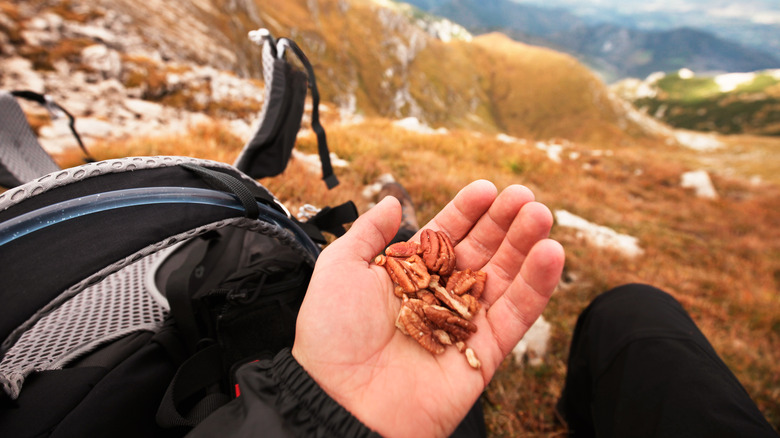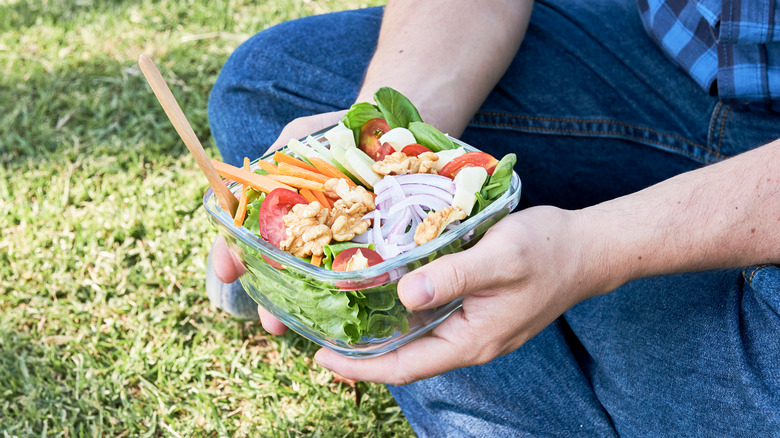When You Eat Pecans Every Day, This Is What Happens To Your Prostate
Pecans are a handy ingredient to have in your kitchen, but they aren't just another type of nut. According to recent research, pecans may be able to help you stave off diseases and improve your health in numerous ways, too.
For instance, in a 2023 study published in Nutrients, mice who ate pecans showed improvements in their blood sugar regulation and overall body mass. Meanwhile, a 2018 article published in Nutrients showed potential correlations between pecan consumption and a reduced risk of cardiovascular disease.
Those findings may be encouraging enough to get you grabbing the occasional handful of pecans. However, if you've been diagnosed with an enlarged prostate (a condition called benign prostatic hyperplasia or BPH), you might want to start adding pecans to your daily diet right away. After all, when you begin fueling up on pecans each day, you're actively lessening your likelihood of experiencing some of the more frustrating side effects of BPH.
Send enlarged prostate symptoms packing with pecans
The power behind pecans' potential to help minimize your chronic BPH symptoms revolves around their nutritional concentration of a phytosterol called beta-sitosterol. In clinical studies, beta-sitosterol has been found to reduce some of the most annoying side effects of BPH, most notably insufficient urine flow and the ability to fully empty the bladder.
For example, the Cochrane Database of Systematic Reviews published a 1999 review of the effects of beta-sitosterols on men with enlarged prostates. The review concluded that there was a probable link between beta-sitosterols and stronger urinary flow based on findings from several double-blind trials. A 2023 study from the American Journal of Clinical and Experimental Urology produced a similar conclusion regarding beta-sitosterols. The study found that younger men who took beta-sitosterols in response to their prostate-related lower urinary tract symptoms (LUTS) were rewarded with a marked improvement in urinary tract flow dysfunction.
This doesn't mean that beta-sitosterol can decrease the size of your prostate if it's bigger than it should be, though. It can't, as WebMD explains. But beta-sitosterol may make some of BPH's annoying side effects more manageable. In fact, some men have found that consuming supplements containing beta-sitosterols allows them to bypass the need to take prescription medications to treat their condition. With that said, WebMD cautions that supplements are not well-regulated. Thus, it's a good idea to talk with a provider when thinking about self-treating your BPH symptoms with beta-sitosterol from any source.
Getting a daily dose of beta-sitosterols
If you and your provider decide that you want to try to reduce your BPH symptoms with beta-sitosterols from food, you'll want to calculate how much beta-sitosterol you're taking in each day. Unsure what dosage of beta-sitosterol to aim for? WebMD reporting indicates that between 60 and 130 milligrams of beta-sitosterol daily can usually be tolerated for up to 18 months.
According to statistics from the U.S. Department of Agriculture, a one-ounce serving of pecans contains approximately 33 milligrams of beta-sitosterol. That means eating just 19 half-shells of pecans gives you a healthy amount of beta-sitosterol in just one sitting.
Of course, just eating pecans can make your palate feel bored. Fortunately, you can find beta-sitosterols in plenty of other foods. A 2013 article from Nutrigenics notes that plant byproducts such as wheat germ, peanuts, pumpkin seeds, and soybeans are all rich in beta-sitosterols. In other words, you aren't relegated to eating pecans all the time. Feel free to swap them for other beta-sitosterol-packed foods to get potential relief from your BPH symptoms.


